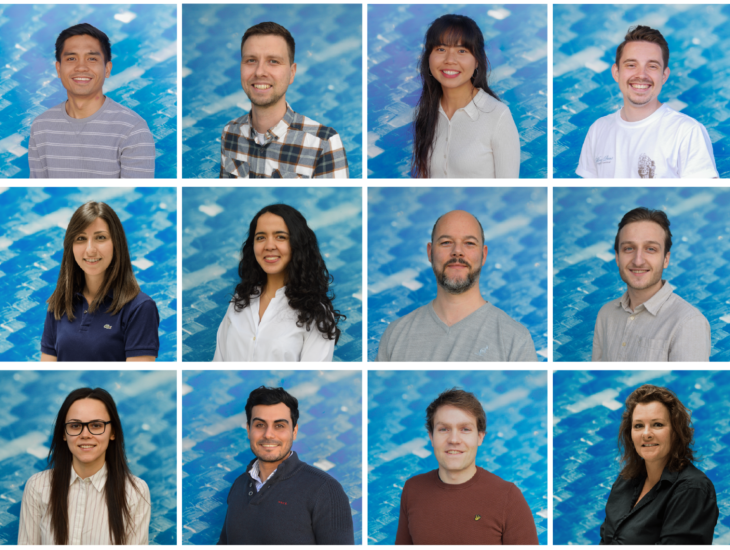#TPRCminds | Sabrine
PhD Researcher
'Seeing what the naked eye can't see'
Her affinity for details was the true beginning of Sabrine’s journey into the world of thermoplastic composites. She moved from Italy to Twente for her master’s thesis, where she grew passion for seeing what the naked eye can’t see. It was this tendency to dive deeper into the micro-scale of polymers that led Sabrine to pursue a PhD at TPRC. Now she is working on significant research for the aerospace and automotive industry, as part of the Enlighten programme.

A remarkable interest in polymers
“I come from a very colorful and warm place," Sabrine says about her home region of Italy, Sicily. After her bachelor's degree at the University of Catania, she decided to finish her mechanical engineering master with a thesis at the University of Twente in Enschede, The Netherlands. This brought her from Italy to Twente in 2021. "I miss Italy sometimes, but I also like it here. The people are very nice."
Sabrine has always had a remarkable interest in polymers. Her graduation at the Sustainable Polymer Chemistry (SPC) group made her plunge even more in the fascinating world of these materials. So, when in 2022 Sabrine was offered to start a PhD project on thermoplastic polymer composites at TPRC, it felt as the perfect fit. “The only thing I knew back then, was that I was going to work on a micro-scale level for the problem they had. That was already exciting for me to know. And it was with polymers - but not just polymers - composites.”
Thermoplastic composites in large aerospace and automotive structures
Thermoplastic composites, or fiber-reinforced polymers, are already used to create lightweight and strong parts in aerospace and automotive structures. However, the material needs to be advanced in order to make larger constructions with it, saving more weight and CO2
emissions. Developing such large-scale thermoplastic composite structures that are both reliable and efficient is the primary aim in the Enlighten programme. Within this initiative works a multidisciplinary team of 13 researchers, one of which is Sabrine. “We know that if you need something to move, the heavier, the worst. If we want to reduce the mass of airplanes and cars, thermoplastic composites can make a change”, says Sabrine.
An important manufacturing technique addressed within the Enlighten project is fusion bonding, in which two parts are joined by melting and solidifying them together. As Sabrine explains, “If you apply fusion bonding in the right way and you can get rid of rivets and bolts in large structures, you will end up with lighter and stronger structures.” Hence, Enlighten aims to bring this technique to a higher level of maturity to narrow down the dependence on mechanical fastening in large structures.
Seeing what the naked eye can’t see
If we zoom in on her job, Sabrine’s research goal is to predict how different polymers would react to certain processing conditions. The task requires attention to the finest of details. “Understanding the polymer physics is necessary to have a better control on processing of thermoplastic composites. If we can predict when polymers are going to crystallize after melting them, we know how much time we have to process them before they form a solid part again.”
For teasing out these material characteristics, Sabrine primarily uses Flash Differential Scanning Calorimetry (Flash-DSC). This is a very useful technique when working with extremely high cooling rates such as in fusion bonding. For this method, samples as tiny as a hair are needed, which Sabrine finds challenging but fun. “You get a pen with a hair on the tip, and with this you place your sample under a microscope, to check if the size requirements are respected. Then you place it on your sensor and you start your measurements”, she explains passionately. “It’s mechanical engineering on a micro level - I try to bring knowledge on what people can’t see with the naked eye”.
A complex challenge in a supportive environment
Starting a PhD gave Sabrine the opportunity to delve into into one subject and become an expert in it - something she was eagerly envisioning from the start. “I like details, so I tend to dive into things, because I want to understand the underlying principles of phenomena. That’s why I was more tended to do a PhD first, instead of just going to industry right away.” And Sabrine is glad she can perform her research at the TPRC, as she finds it a very supportive environment. "It’s a place where you have plenty of freedom. And that freedom lets you do things in a better way. It’s welcoming and no one is left alone – if you have a problem, you just talk to your colleagues and have a coffee. And I think this is a shared feeling by everyone here, students, PhDs, staff members, and others."
Halfway through her PhD journey, Sabrine is now fully immersed in the crystallization kinetics of polymers. She finds her research complex but satisfying. “When you just get started, you roughly have an idea of what’s the problem. But once you start doing things, you see where the gaps are and how much should be done. It’s really challenging, but in the end you will certainly extend the boundaries of the current knowledge.” Sabrine is now busy writing her first paper that will cover the results of her dedicated work so far. With her untempered passion to explore the behavior of polymers, ahead lies a future where Sabrine will play a crucial role in shaping lightweight composite structures for aerospace and automotive engineering.
Stay tuned for Sabrine’s first publication that will be coming soon.
Our series #TPRCminds introduces you to the people behind our success. Who are they? What is their background? What drives them and how do they look at the future of thermoplastic composites? Continue reading other #TPRCminds episodes:




